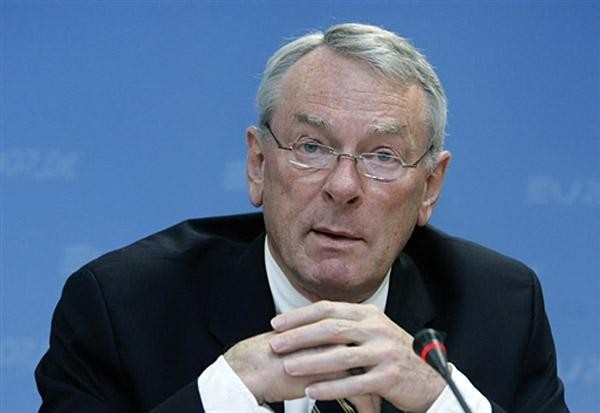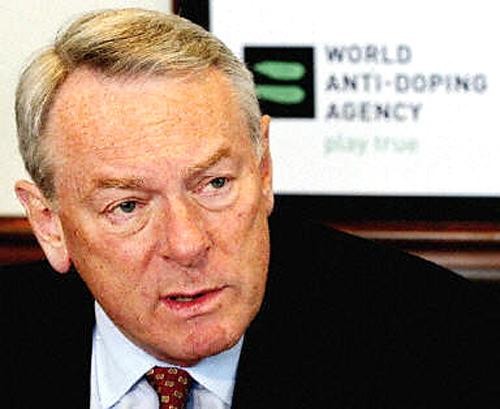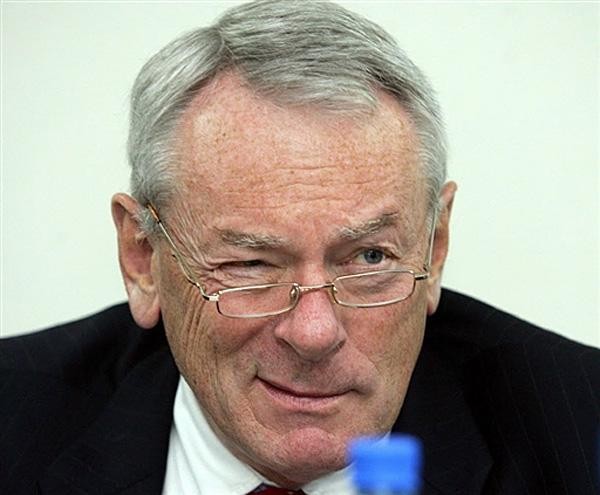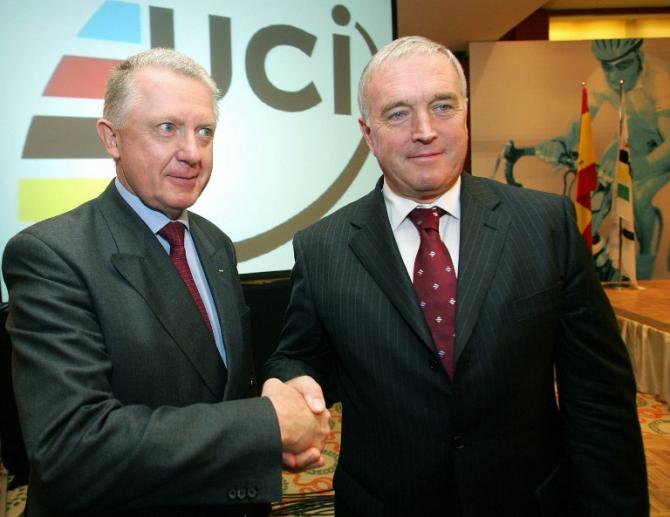Pound: Past UCI leaders only wanted to shoot the messenger
Former WADA head says 'now it's all come out'




Dick Pound, the first president of the World Anti-Doping Agency, came into his post at the height of cycling's EPO era, and has taken a lot of criticism as a result of his being openly critical of the past UCI's administrations' handling of doping in the sport.
With the publication of the Cycling Independent Reform Commission's report, Cyclingnews spoke to Pound about his interactions with the UCI, the defamation lawsuit former presidents Hein Verbruggen and Pat McQuaid launched against him, and what recourse there might have been to take against the UCI.
One of the recommendations of the CIRC report was for WADA to amend its rules to allow for other punishments to international federations that do not comply with the anti-doping code. Currently, the only recourse is for WADA to appeal individual decisions on doping cases to the Court of Arbitration for Sport (CAS), or the "nuclear option": to recommend to the International Olympic Committee (IOC) that a federation like the UCI be expelled from the Olympic Movement.
Cyclingnews: Should cycling have been kicked out of the Olympic Movement?
Dick Pound: If they hadn't done this (CIRC), then yes. Maybe just road cycling, because that's where the major problems seemed to be. It's a last resort. You're not looking for excuses to kick people out of the Olympics. What you'd really like to do is stop the doping.
CN: Did WADA have any recourse to punish the UCI during the Verbruggen/McQuaid era?
RP: WADA has been reluctant to pull the trigger on punishment. If you see the lengths that cycling leadership was going to go through to protect their poster boy – they were colluding with him to make sure he didn't get caught, accepting backdated TUEs and all sorts of stuff like that ... I think perhaps, it's a good time for WADA to say, look, this stuff is going on, it's up to us to make the necessary decisions and recommendations, to report non-compliance to the international federation (IF) and say "do your duty", or report it to the IOC and say we have a problem with this federation and you've got to take the necessary actions.
The latest race content, interviews, features, reviews and expert buying guides, direct to your inbox!
CN: What do you think of the suggestion by CIRC that "instead of one ultimate sanction [removal from the Olympic Movement), whose threshold is very high and which in practice has never been applied, the WADA Code should be amended to include a range of measures and sanctions for non-compliant federations."
RP: If you find a federation is not code compliant, WADA would report that and the International Federation (IF) should take action. If the suggestions is WADA should do that, I think I'd want to put in place a deal where WADA could provisionally suspend an IF, subject to the right of appeal to CAS. I don't think you'd want to have WADA be the investigator and final judge and jury of that.
I like the idea that the IFs and the national federations assume their responsibilities, and if they don't, someone else can come along and declare them non-compliant, and consequences will flow.
WADA has this independent right of appeal to CAS. If we think an IF has not properly applied the code, we can go to CAS, and have done so on many occasions. Eventually it becomes a good motivator for IFs to do it right in the first place, because if they don't, they'll be faced with the expenses of another appeal and a growing public awareness that they're not doing their job.
CN: Has cycling ever been threatened with expulsion from the Olympic Movement?
RP: To my knowledge it has not. The first step is WADA has to have enough spark to declare that there is non-compliance. That's the necessary first step before the IOC or anybody else can step in to do it, unless [the IOC] happen to have independent knowledge of the non-compliance. By and large they'd punt and say, "Look, WADA, you're the international monitoring agency, are you making a declaration of non-compliance or not?" If we're not, then chances are neither the IOC nor anybody else is going to take a decision on its own.
CN: I would imagine it would be difficult to prove the UCI was intentionally non-compliant.
RP: You may need something like this commission to prove it. The trail was there. Can you imagine in an inquiry involving your poster boy [Lance Armstrong], and that poster boy's lawyers are drafting huge chunks of the so-called independent report? And Verbruggen is writing them, saying listen, the only organization where you're finding fault is with the UCI, and it makes it look as if WADA is your client? As if the mere fact that they had started the commission was a guarantee that they'd never be criticized. It was bizarre, It involved a lot of lying to the public and the stakeholders.
CN: It was interesting reading about the defamation suit that Verbruggen and McQuaid launched against you.
RP: That was part of their typical battery of intimidation. They thought people could be browbeaten into agreeing with them. We said "no, let's put it all out on the table." When we took that view, they were quite willing to settle. The court said, "look, you guys had better sit down, because it would be a long and very messy case." We had put together a complete record of the efforts we had made, and the efforts we thought the UCI had not made, and the involvement of the leadership. I think they eventually realized it was going to cost them a lot of money and they were going to lose. That's what all lawyers should do with their cases before they go rushing off to court.
CN: Do you feel vindicated by what the USADA case and CIRC have uncovered – that you were right about what you said about cycling?
RP: I never felt "unvindicated". [Hein Verbruggen and Pat McQuaid] never wanted to go after the root of the problem, they just wanted to shoot the messenger. That's 90 per cent of what McQuaid and Verbruggen were doing.
When you have Lance Armstrong's lawyer writing big chunks of the ["independent" Vrijman] report, namely with the objective of trying to discredit WADA and me - that was worse than I even thought the situation might be. But now it's all come out. I think cycling has to digest it. I see Hein's issued a statement congratulating himself for having been such a wonderful person through his presidency. It's a shame that people are trying to rewrite history.
CN: What about the report stating your conflict with Verbruggen resulted in you losing out to Jacques Rogge in the election for IOC president in 2001.
RP: I saw that in the report. At no time when I was running (laughs) so poorly to become president [of the IOC] did I think Hein would support me as opposed to his friend and neighbor Jacques Rogge. That was not one of the votes I counted on, and I never expected to get. It actually had nothing to do with the presidential campaign at all.
CN: Was there ill will with Verbruggen prior to the election?
RP: I wouldn't say we had ill will. I always thought he was misguided in his expressed views as to what should happen. Cycling from the beginning of WADA was always opposed to any kind of meaningful sanction for doping offences. They fought and fought against the initial two-year default penalty. I think that's when things began to become unraveled, when Verbruggen saw that WADA was not going to back down on this. He resigned in a huff from the board and started this campaign to make WADA nothing more than a service organisation. Half of WADA is the public authorities of the countries from around the world. How he would have thought they would stand for any kind of proposition that they were just there to support the International Federations in whatever activities they wanted to do. It was like, what are you smoking?
CN: The situation seems to have gotten better with cycling. Do you agree? Or do you think doping has just been driven further underground?
RP: I think it's been driven farther underground. We're better at testing, but one of the problems with cycling is they would never let us test their athletes. They said as soon as the season starts, for cycling it's in-competition, and only the UCI can test in-competition. We never got a chance to do targeted or other tests of their athletes.
CN: Is the UCI doing a better job now under Brian Cookson?
RP: I hope so. I think Cookson did the right thing by finally getting a sensible independent commission organised, unlike the first one they put together that just crashed and burned because the terms of reference were so ridiculous. Nobody was prepared to go through another charade like the Vrijman commission. So this is good. They're going to have to digest that. There are a lot of very sensible recommendations to be considered.
A lot of very bad things were going on, and known to the leadership. In many respects the leadership was actively involved. It's a pretty serious indictment of the federation. It's going to have to work hard to turn the corner. I certainly hope Cookson's the kind that can do it.
CN: Was the idea of amnesty the reason the first commission was disbanded? Or was it because of the terms of reference?
RP: I think having seen what happened with the first one, the next commission said if you want this to happen, we have to have complete independence and not be directed from within the UCI in any way.
I don't think anyone was pushing for amnesty. One of the suggestions was that you won't be able to make any significant changes in cycling until you have a “truth and reconciliation” commission. You need to have everybody involved, and say this was what was going on, and that's the way it operated, and we've got to change that. There has been in the WADA code for many years a provision to benefit much reduced sanctions for providing substantial assistance. I was one of those who thought maybe the truth and reconciliation thing is the answer. You have to get people to acknowledge there's a problem. There's a parallel with alcoholics, there's no possible cure unless you admit the problem.
CN: But the offers of reduced sanctions didn't get anyone to come in to admit something they hadn't been caught for already.
RP: Cycling has been particularly vicious with respect to any whistleblowers. They're treated worse than the people who are doping. My guess is that even though this possibility existed, those who are still out in the field say, “They say it will be OK, but we know how this happens. You're not going to be able to get a job as a rider with any team, or you're not going to be a soigneur when you're finished. Let's just keep the omerta in place.”
Editor's Note: Cyclingnews asked about the investigation, which Pound heads, into systematic doping and cover-ups by the athletics federation in Russia but he refused to comment on the parallels between the two investigations. That investigation will wrap up in November or December of 2015.

Laura Weislo has been with Cyclingnews since 2006 after making a switch from a career in science. As Managing Editor, she coordinates coverage for North American events and global news. As former elite-level road racer who dabbled in cyclo-cross and track, Laura has a passion for all three disciplines. When not working she likes to go camping and explore lesser traveled roads, paths and gravel tracks. Laura specialises in covering doping, anti-doping, UCI governance and performing data analysis.
